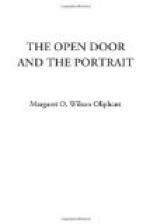* * * * *
“Noises?—ou ay, there’ll be noises,—the wind in the trees, and the water soughing down the glen. As for tramps, Cornel, no, there’s little o’ that kind o’ cattle about here; and Merran at the gate’s a careful body.” Jarvis moved about with some embarrassment from one leg to another as he spoke. He kept in the shade, and did not look at me more than he could help. Evidently his mind was perturbed, and he had reasons for keeping his own counsel. His wife sat by, giving him a quick look now and then, but saying nothing. The kitchen was very snug and warm and bright,—as different as could be from the chill and mystery of the night outside.
“I think you are trifling with me, Jarvis,” I said.
“Triflin’, Cornel? No me. What would I trifle for? If the deevil himsel was in the auld hoose, I have no interest in ’t one way or another—”
“Sandy, hold your peace!” cried his wife imperatively.
“And what am I to hold my peace for, wi’ the Cornel standing there asking a’ thae questions? I’m saying, if the deevil himsel—”
“And I’m telling ye hold your peace!” cried the woman, in great excitement. “Dark November weather and lang nichts, and us that ken a’ we ken. How daur ye name—a name that shouldna be spoken?” She threw down her stocking and got up, also in great agitation. “I tellt ye you never could keep it. It’s no a thing that will hide, and the haill toun kens as weel as you or me. Tell the Cornel straight out—or see, I’ll do it. I dinna hold wi’ your secrets, and a secret that the haill toun kens!” She snapped her fingers with an air of large disdain. As for Jarvis, ruddy and big as he was, he shrank to nothing before this decided woman. He repeated to her two or three times her own adjuration, “Hold your peace!” then, suddenly changing his tone, cried out, “Tell him then, confound ye! I’ll wash my hands o’t. If a’ the ghosts in Scotland were in the auld hoose, is that ony concern o’ mine?”
After this I elicited without much difficulty the whole story. In the opinion of the Jarvises, and of everybody about, the certainty that the place was haunted was beyond all doubt. As Sandy and his wife warmed to the tale, one tripping up another in their eagerness to tell everything, it gradually developed as distinct a superstition as I ever heard, and not without poetry and pathos. How long it was since the voice had been heard first, nobody could tell with certainty. Jarvis’s opinion was that his father, who had been coachman at Brentwood before him, had never heard anything about it, and that the whole thing had arisen within the last ten years, since the complete dismantling of the old house; which was a wonderfully modern date for a tale so well authenticated. According to these witnesses, and to several whom I questioned afterwards, and who were all in perfect agreement, it was only in the months of November and December that “the visitation”




